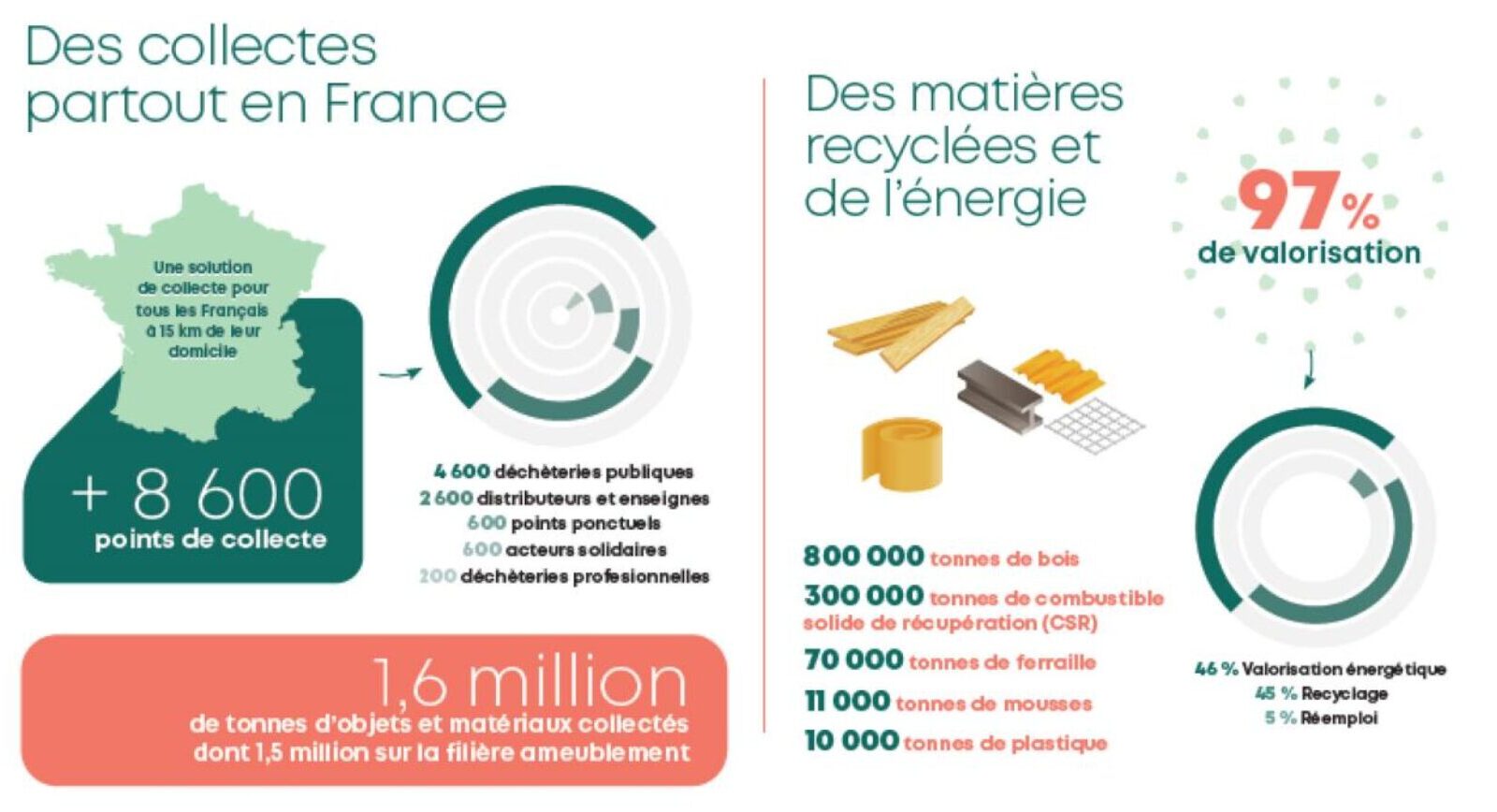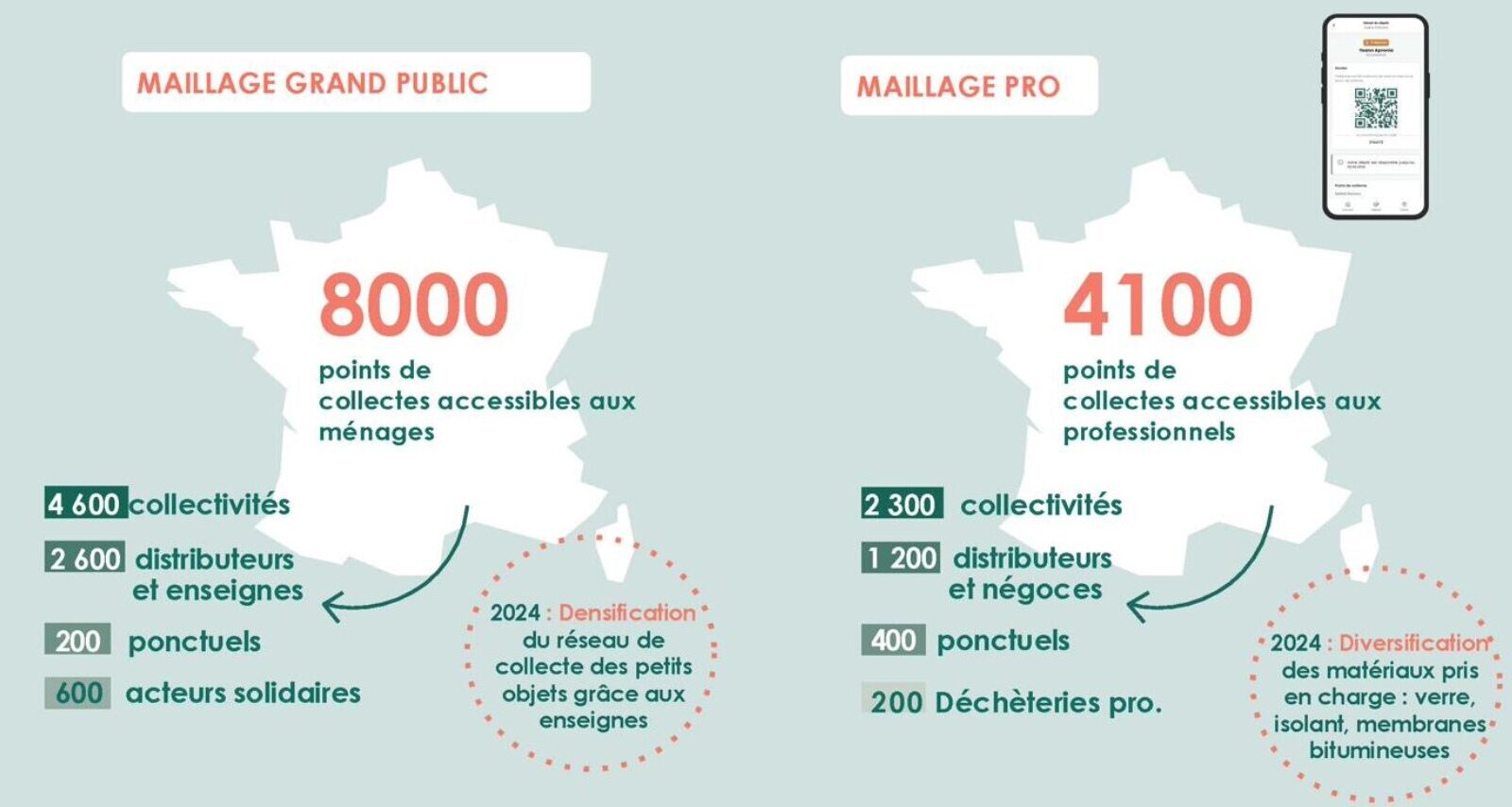Ecomaison, the approved eco-organization for the management of household objects and materials, has published its annual collection, reuse and recycling figures. Positioned in four sectors, Ecomaison has made the most of its experience in furniture, building products and building materials, DIY and garden products, and games and toys.
By the end of 2023, Ecomaison had more than 12,000 member companies, representing 5.2 million tonnes of products placed on the market. Ecomaison collected 332.4 million euros in eco-participation from its members, for the four sectors. Ecomaison financed and organized the collection of 1.6 million tonnes of household objects and materials.
Its network of collection partners, comprising 8,600 points across the country (public and professional drop-off centers, distributors and retailers, community organizations), enables Ecomaison to offer a collection point within a 15 km radius to all French people. Recycling performance reaches a recovery rate of 97% for products handled by Ecomaison, including reuse, recycling and energy recovery.

A priority: local collection points for both private and professional customers

Focus on the furniture sector (WEEE)
Furnishings alone account for 1.5 million tonnes of products and materials managed by Ecomaison. Having built up and deployed this sector for over 10 years, Ecomaison is continuing its work to encourage longer product lifetimes, through funds dedicated to repair and reuse. As part of the 2024-209 agreement, Ecomaison has pledged 140 million euros over the next six years to finance and develop actions in favor of reuse by players in the social economy. In addition, the gradual deployment of the Repair Bonus is a major challenge for Ecomaison, as it gives structure to a sector where the repair offer is not yet mature.
Focus on the Building Products and Materials sector (PMCB)
Over the course of 2023, Ecomaison has pursued two main avenues of development for the fledgling sector:
- bringing companies into line with the May 2023 application of an eco-participation scale modulated according to product recyclability,
- equipping the take-back points of DIY and retail chains. In parallel with these actions, to meet the objectives set out in the specifications, Ecomaison is calling on the public authorities to rebalance collection targets by material, and to smooth the deployment trajectory of the building sector. Progressivity is essential if the sector is to be economically sustainable for companies in the sector, and to enable investment in industrial solutions for recycling this waste.
Focus on the Do-It-Yourself and Garden Equipment (DIY) sector
The Do-It-Yourself and Garden Equipment sector covers a wide range of products, with very diverse weights and dimensions: from screwdrivers to garden sheds, for example. Ecomaison launched a consultation in 2023 to adapt its collection containers to small products: pallet-boxes. By the end of 2023, 900 distributors had been equipped, as well as 1,400 public and 40 professional waste collection centers. In the area of re-use, local agreements have been signed between stores and associations to give them access to a pool of quality products from retailers' take-backs.
Focus on the Games & Toys (J&J) industry
2023 was a year marked by a very strong acceleration in the equipment of collection points for toys. Nearly half of all public drop-off centers have been equipped. The challenge was also to rapidly involve stores in the drive to take back used toys: 800 sales outlets - including specialist chains - were equipped with collection bins and signage on sorting instructions. At the same time, over 360 agreements were signed with associations and retailers for the collection of toys for recycling.
In 2023, Ecomaison carried out a number of solidarity collection operations with a view to reuse:
- with the Académie de Versailles, collected from nearly 200 nursery and elementary schools,
- with ecosystem, as part of the "Let your heart speak" operation, collecting over 43,000 kilos of toys in just a few days at more than 670 collection points,
- with Emmaüs Défi, Refashion and the City of Paris, installation of double toy/textile collection bins in Paris town halls.
These collection operations were accompanied by educational initiatives focusing on donation, sorting and the second life of toys.